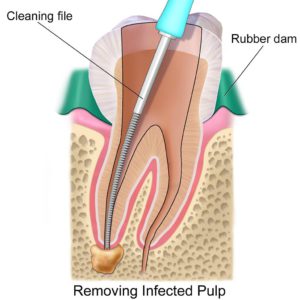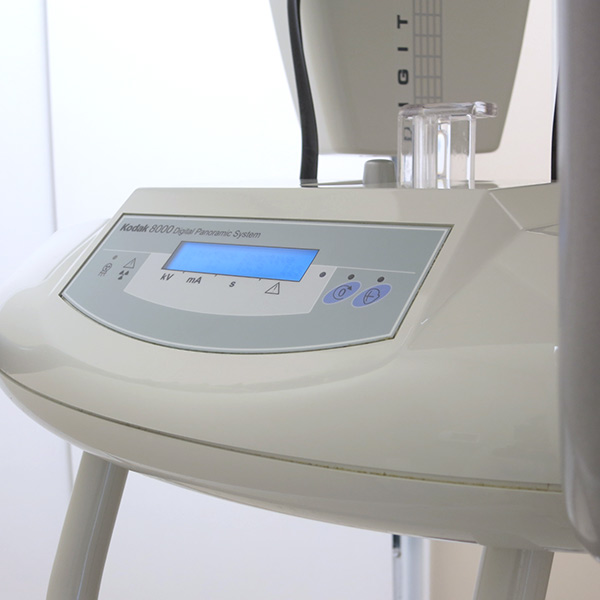
Root canals are physical canals inside a tooth that are naturally inhabited by nerve tissue and blood vessels, otherwise known as “dental pulp”. When cavities are left untreated, the bacteria eventually reaches the root canals, causing infection of the dental pulp.
Root canal treatment is the removal of the infected pulp, the shaping, cleaning, and decontamination of the canals, and the filling of the decontaminated canals with an inert filling, all of which result in the elimination of infection. Root canal treatments often involve the placement of a crown on top of the treated tooth to restore the natural appearance of the tooth.

" width="300" height="300" class="alignright wp-post-image">
You may require a root canal treatment if the pulp of your tooth has become infected due to excessive tooth decay or injury. Leaving a tooth with infected root pulp untreated can lead to a spread of the infection into the jaw and surrounding tissues.
The only alternative to root canal treatment is the extraction of the affected tooth. Antibiotics can temporarily keep infection from spreading to surrounding tissues, but will not eliminate the source of the infection, which is the infected pulp tissue inside the canal.
If you choose extraction, the extracted tooth can be replaced with a bridge, denture or implant. Extracting a tooth and not replacing it may lead to other serious issues if your teeth shift over time to fill the gap.
Patients are typically given the same anesthetic provided during the treatment of cavities and other dental procedures. This anesthetic completely numbs the affected area, so a root canal treatment is typically no more painful than a standard filling. However, the procedure does take longer and may sometimes require more than one visit depending on the severity of the infection. There is usually some minor discomfort after the anesthetic wears off that can be easily controlled by pain medication.





How much does the root canal cost?
Hi Khalil, thank you for your inquiry. The price of root canal treatment varies depending the type of tooth and the number of canals. On average, a molar tooth will have 3-4 canals, but it can have anywhere between 2-6 canals. A front incisor tooth will typically have 1-2 canals. Molar root canal treatments will cost more because of the greater number of canals and more complexities of the treatment. An exam with X-ray is typically needed to help determining the specific pricing. For more information, please contact us at [email protected] or call us at 905-707-8008.
Hey I had a root canal done in August and during end of October and now January I keep have sensitivity on the tooth they did the surgery on and the tooth next to it towards cold things or really sweet food ( like milk chocolate). Would I need to get the root canal redone?
Hi Bea, unfortunately it’s not possible for me to tell you the exact cause of the sensitivity you’re experiencing without a direct examination of your teeth and X-rays and performing some tests. The sensitivity could also be caused by cavities on the teeth next to the root canal treated tooth. You should definitely visit a dentist soon.
Sir I am going to sit for RCT. I have heard that rct may cause infections in future due to filing. Is this true? Is rct safe?
Hi Sara, root canal treatment is a safe and effective procedure for teeth whose pulp has become inflamed or infected. It is a better alternative to tooth extraction in most instances. As with all dental procedures, there is a small but potential risk of failure. Please talk to your dentist regarding your concerns prior to the treatment.
Hello.
I had a root canal procedure finished today. As the freezing has come out I am in the same amount of pain I was in a couple weeks ago before my first appointment. The tooth is 26 I believe, top left, second last molar. The tooth is having vibrating/pulsing feelings in it, as if the tooth is being hit or pulled on. Does this mean the procedure failed??
Hi Kim, it is too early to tell if the root canal treatment is successful or not. It is normal to have some discomfort or some pain right after a root canal treatment; especially if the infection you had was advanced. The pain should get better in a few days, if not please contact your dentist for a followup appointment.
Hi Dr. Qin Li!
I have a RCT scheduled about 5 weeks from now. I started taking antibiotics 3 days ago.
Is it ok to wait this long for a RCT? I’m just worried about the infection spreading, bone loss, or worsening state of the infected tooth in that time span.
Should I find another dentist who can schedule me in earlier?
Thanks.
Hi Lisa,
Without a physical examination, I cannot comment on your specific case. My guess is that your dentist probably doesn’t have an earlier appointment and sees no immediate issue with waiting for 5 weeks. You were probably placed on antibiotics to try to prevent the spread of the infection for that 5 week period.
Typically, if a patient is not in discomfort and there is no swelling of the face/cheek/ gum, then there is likely little danger in waiting for a short period of time. However, if any of the symptoms mentioned above appear and antibiotics are not helping, I would typically recommend starting the treatment earlier. You can asked to be put on a last minute cancellation list at the dental office in case any earlier appointment time opens up. If you are still concerned, ask your dentist if he or she has someone they can refer you to.
I still have numbness in my lips due to anesthesia after i had my root canal procedure 2 days ago
Could you please advise is this is normal and what should i do ?
Hi Mohamed, the loss of sensation in your lip after root canal treatment is called paresthesia. It is an uncommon but potential side effect of root canal treatment. The occurrence of paresthesia in lower premolars after root canal treatment is as low as 0.98% in an article posted in the Journal of Canadian Dental Association (see link below). Most of the time it is a temporary loss of sensation, but may take awhile for the sensation to come back. Occasionally the loss of sensation may be permanent. Please call your dentist and let him/her know of the situation and schedule a post treatment exam as soon as you can.
https://jcda.ca/article/e13